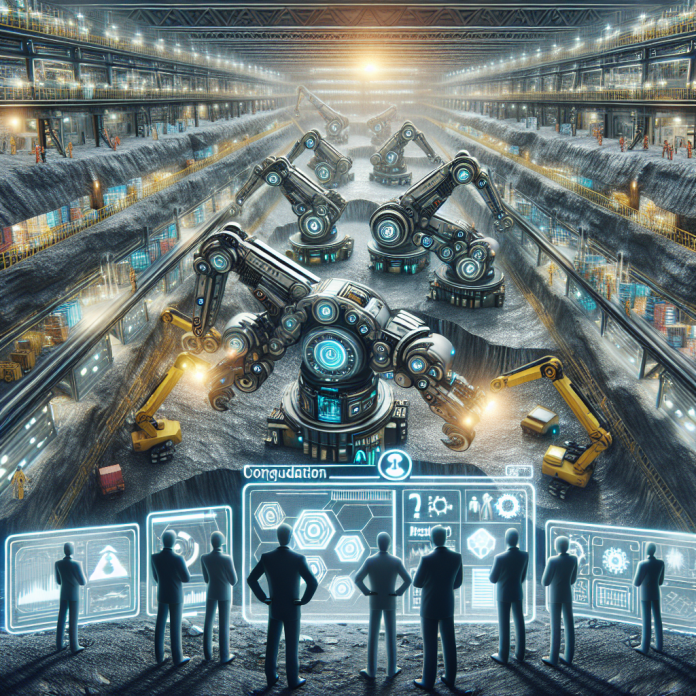**Introduction**
Imagine a world where machines work tirelessly underground, extracting valuable minerals with precision and efficiency. This may sound like something out of a science fiction movie, but with advancements in artificial intelligence (AI), this scenario is becoming a reality. AI is revolutionizing the mining industry, transforming the way extraction processes are carried out. In this article, we will explore the role of AI in mining, its impact on the industry, and the potential benefits it brings.
**The Role of AI in Mining**
AI is reshaping the mining sector by providing innovative solutions to age-old challenges. From autonomous drilling to predictive maintenance, AI-powered technologies are enhancing operational efficiency and safety in mines around the world. Let’s delve deeper into some key areas where AI is making a difference:
**1. Autonomous Equipment**
One of the most notable applications of AI in mining is the use of autonomous equipment. These self-driving machines are equipped with sensors, cameras, and AI algorithms that enable them to navigate through mines, drill blast holes, and transport materials without human intervention. By eliminating the need for human operators in dangerous environments, autonomous equipment enhances safety and productivity in mining operations.
**2. Predictive Maintenance**
AI algorithms can analyze real-time data from sensors installed on mining equipment to predict when maintenance is needed. By detecting potential issues before they cause machine breakdowns, predictive maintenance helps minimize downtime and reduce maintenance costs. This proactive approach to equipment maintenance is a game-changer for mining companies looking to optimize their operations.
**3. Exploration and Geology**
AI is also being used in mining exploration and geology to identify potential mineral deposits. Machine learning algorithms can analyze geological data, satellite imagery, and other relevant information to pinpoint areas with high mineral potential. This saves time and resources that would otherwise be spent on traditional exploration methods, leading to more cost-effective mining projects.
**4. Environmental Monitoring**
Mining operations can have a significant impact on the environment, from water contamination to deforestation. AI technologies are helping mining companies monitor and mitigate these risks by analyzing environmental data in real-time. By detecting anomalies and predicting potential environmental hazards, AI enables proactive measures to be taken to minimize the environmental footprint of mining activities.
**The Impact of AI on the Mining Industry**
The integration of AI technologies in mining operations is revolutionizing the industry in several ways. Here are some of the key impacts of AI on the mining sector:
**1. Increased Efficiency**
AI-powered solutions improve operational efficiency by optimizing processes, reducing downtime, and enhancing productivity. Autonomous equipment, predictive maintenance, and advanced data analytics streamline mining operations, leading to higher output and lower costs.
**2. Improved Safety**
Safety is a top priority in the mining industry, where workers are exposed to hazardous conditions on a daily basis. AI technologies such as autonomous equipment and real-time monitoring systems enhance safety by minimizing human error and reducing the risk of accidents. By taking over dangerous tasks, AI ensures that workers are out of harm’s way.
**3. Sustainable Practices**
Mining companies are under increasing pressure to adopt sustainable practices and reduce their environmental impact. AI plays a crucial role in achieving these goals by enabling better resource management, environmental monitoring, and energy efficiency. By optimizing processes and minimizing waste, AI helps mining companies operate in a more environmentally responsible manner.
**Real-Life Examples of AI in Mining**
To illustrate the practical application of AI in the mining industry, let’s look at some real-life examples of companies leveraging AI technologies:
**1. Rio Tinto**
Rio Tinto, one of the world’s largest mining companies, has implemented autonomous haul trucks and drills in its iron ore mines in Western Australia. These driverless machines are controlled by a centralized operations center, where AI algorithms optimize their routes and performance. This has led to significant improvements in productivity and safety at Rio Tinto’s mining sites.
**2. Barrick Gold**
Barrick Gold, a leading gold mining company, is using AI-powered predictive maintenance to optimize the performance of its fleet of mining equipment. By analyzing data from sensors and equipment diagnostics, Barrick Gold can anticipate maintenance needs and schedule repairs before breakdowns occur. This proactive approach has helped reduce downtime and maintenance costs for the company.
**3. IBM Watson**
IBM Watson, the AI-powered cognitive computing platform, is being used in the mining industry to analyze geological data and predict mineral deposits. By applying machine learning algorithms to geological information, IBM Watson can identify patterns and anomalies that indicate the presence of valuable minerals. This technology has the potential to revolutionize the way mining companies approach exploration and resource discovery.
**Conclusion**
In conclusion, AI is playing a transformative role in the mining industry, driving innovation, efficiency, and sustainability. From autonomous equipment to predictive maintenance, AI technologies are revolutionizing the way mining operations are conducted. By harnessing the power of AI, mining companies can optimize their processes, enhance safety, and reduce their environmental impact. As AI continues to evolve, its impact on the mining sector is only expected to grow, paving the way for a more efficient and responsible industry.

